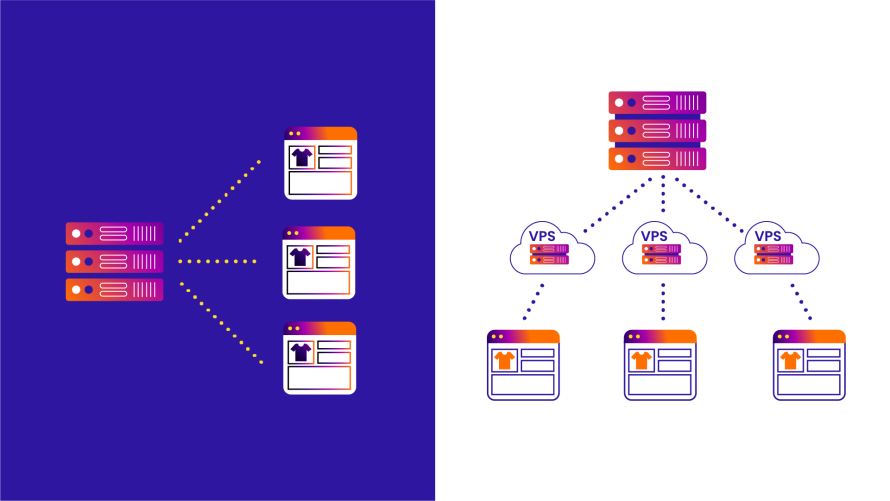Complete Guide to Cloud Hosting Services 2024
Web development teams often face a common set of questions that can significantly impact the scalability and functionality of their projects: “Can we implement feature X on our website?” or “How quickly can we build and deploy application Y?” Naturally, the team's goal is to be able to do these actions easily. However, this largely depends on the capabilities of their cloud hosting service.
There are many cloud hosting options, ranging from the highly selective VIP services, known for their stringent requirements, to the boundless possibilities offered by giants like Amazon Web Services (AWS). Yet, with AWS, the trade-off often comes in the form of either lengthy development times or the need for advanced technical expertise. What business owners and developers need to remember is that there isn't a one-size-fits-all solution in cloud hosting. Instead, you need to find the perfect balance between rapid deployment capabilities and maintaining system stability.
Pantheon is designed to be flexible and reliable – offering an appealing middle ground with “guardrail” options. It’s built around the concept of horizontally scalable containers, which allow web teams to scale their projects up or down without having to overhaul their entire architecture. This scalability is particularly beneficial for enterprises managing a portfolio of sites, ensuring they can meet varying traffic demands efficiently.
Image

Despite the clear advantages of cloud hosting, it has its challenges. Concerns regarding security, data migration and compliance with regulations are common pain points for many organizations.
That’s why, in this comprehensive guide, we’ll show you that cloud hosting doesn’t have to be complicated. We'll explore the ins and outs of selecting the right hosting service for your needs, address common concerns and provide insights to navigate the vast cloud hosting ecosystem with confidence.
What Is Cloud Hosting?
Cloud hosting represents the next evolution in hosting websites and applications and managing vast datasets. It transcends the limitations of traditional hosting solutions that depend on physical hardware located in a single data center.
Instead, cloud hosting uses virtualization technology to offer services via virtual servers, which are not bound to a single physical location but distributed across multiple interconnected data centers worldwide. This innovative approach provides unparalleled scalability, flexibility and redundancy, setting a new standard for hosting services.
How Does Cloud Hosting Work?
Image

Cloud hosting uses virtualization to create a virtual layer over the physical server hardware allowing for efficient content management and storage. It's this virtual layer that makes the cloud both flexible and powerful. Within this environment, the virtual servers, which host websites or manage data, are not tied to a single physical server. Instead, they can be replicated and spread across numerous servers situated in various locations around the globe.
Cloud hosting's distributed nature means it can easily scale resources up or down based on demand. For example, if a website experiences a sudden spike in traffic, additional virtual server resources can be allocated to handle this increase seamlessly. Similarly, during periods of low traffic, resources can be scaled down to reduce costs.
This level of scalability and flexibility is a significant departure from traditional hosting, where scaling often means upgrading to a more substantial, more expensive physical server or enduring downtime while migrating to a new server.
Additionally, the redundancy built into cloud servers ensures higher levels of data protection and availability. Since data and resources are replicated across multiple servers in different locations, the failure of one server does not lead to downtime or data loss. Instead, traffic can be rerouted to other servers in the network, maintaining the website's availability and performance.
Advantages of Cloud Hosting
Cloud hosting is rapidly becoming the preferred choice for businesses and web teams looking for efficient, reliable and scalable web hosting services. This preference is driven by several advantages that cloud hosting holds over traditional hosting methods:
Scalability
The ability to scale resources on demand is essential for businesses experiencing fluctuating traffic. Cloud hosting excels in this area by allowing for the instant allocation or de-allocation of resources based on current needs without significant downtime or cost impact.
For instance, on platforms like Pantheon, scaling up from a basic plan to accommodate a surge in traffic is as simple as a click. More containers provision instantly, ensuring your site can handle increased load without a hitch.
“Everyone was looking for the silver bullet in hosting. I originally had my own setup – and that was fine – until we needed to scale. I knew Pantheon would meet all of my needs and grow for the future.” – James McBryan, Founder of Track it Forward, Head of the Charles Regatta
Cost-Effectiveness
Cloud hosting introduces a pay-as-you-go pricing model, which is very beneficial for businesses looking to manage expenses efficiently. This model allows companies to pay only for the resources they use, avoiding the hefty upfront costs associated with purchasing and maintaining physical hardware. This cost-effective approach to hosting can lead to significant savings over time, making cloud hosting an attractive option for businesses of all sizes.
Performance
In cloud hosting, resources are spread out across multiple servers in different locations, leading to lower latency and faster load times for end-users worldwide. This improvement in performance can enhance the user experience, reduce bounce rates and improve SEO rankings, making it a critical factor for businesses aiming to maintain a competitive edge online.
Reliability and Uptime
Thanks to its redundancy and resource pooling, cloud hosting often has higher uptime and greater business continuity than traditional hosting solutions. In the rare event of server failure, traffic is automatically rerouted to other servers within the network, minimizing downtime and ensuring that websites remain accessible.
Disaster Recovery
Cloud hosting simplifies the configuration of disaster recovery options. At Pantheon, we’ve gone a step further by architecting a high-availability Multizone Failover solution. This intelligent system ensures that mission-critical websites remain online even in the event of a complete data center outage, providing peace of mind for businesses with high-stakes online operations.
Maintenance and Updates
Cloud hosting providers handle server maintenance and updates, ensuring the hosting infrastructure is always up-to-date with the latest security patches and performance improvements. Pantheon’s Managed Updates service exemplifies this benefit, as highlighted by Nancy Gruwell, VP of Marketing at HDR:
“From the business side, it’s great when you don’t hear about your hosting provider. That means there aren’t any issues, everything’s working the way it’s supposed to be and if there are any issues, they’re being resolved. That’s what Pantheon does for us.”
Cloud Hosting vs. Web Hosting
Web hosting plays a fundamental role by providing the infrastructure needed for websites to be accessible on the internet. It involves a single server hosting the files and content of a website. When users visit a domain, their web browser downloads these documents and files, enabling them to view and interact with the website. This traditional approach to hosting can be categorized into four distinct environments, each catering to different needs and preferences:
- Shared Hosting: In this setup, a single server hosts multiple domains. It's an economical choice, but the shared environment often results in limited resources and potential performance issues.
- Dedicated Hosting: Here, a domain leases one or more servers exclusively. This option offers robust performance and security but at a higher cost.
- Managed Hosting: This is similar to dedicated hosting, but the hosting provider manages all aspects of server maintenance, offering clients a hassle-free solution.
- Virtual Private Server (VPS): This environment provides a virtual, isolated portion of a server to a domain. It strikes a balance between shared and dedicated hosting, offering more resources and customization options than shared hosting without the cost of a dedicated server.
Cloud hosting’s decentralized approach allows for effortless scaling as demand increases without the need to physically change servers or service plans.
Pantheon has scaled seamlessly for the huge post-election traffic spikes that we’ve seen.”
– Marco Carbone, Associate Director of IT, ACLU
Moreover, because the website's data is replicated across multiple servers, cloud hosting offers enhanced reliability and uptime compared to traditional web hosting.
We can continue scaling with the peace of mind that our site can take a rapid, exponential increase in visitors and stay fast.”
– Adam Ijaz, CEO at dbrand Inc
Cloud Hosting vs. VPS
Image

Cloud hosting and VPS have carved out essential roles in the hosting ecosystem, catering to users with a need for more control and customization than what is typically offered by shared hosting. Both hosting types provide a dedicated environment for users, with the hosting provider taking charge of maintenance and upgrades.
However, despite these similarities, there are distinct differences between cloud hosting and VPS, especially when it comes to resource distribution, performance stability and customization:
Resource Distribution
Cloud hosting utilizes a network of interconnected servers, spreading the hosted website's data across these servers. This distribution allows cloud hosting to offer unparalleled scalability and reliability. If a website experiences a surge in traffic or one server goes down, the system can automatically redistribute resources or reroute traffic to maintain performance and uptime.
In contrast, VPS typically operates on a single physical server that is partitioned into multiple virtual machines (VMs). Each VPS acts as a dedicated server but shares the physical server's resources with other VPSs.
While this setup offers more resources and isolation than shared hosting, it does not provide the same level of scalability or reliability as cloud hosting. If the physical server experiences issues, all VPSs on that server could be affected. Similarly, scaling resources often involves upgrading to a higher-tier VPS, which can be less flexible and slower compared to the almost instantaneous scaling in cloud hosting.
Performance Stability
Cloud hosting is often able to offer more stable performance, especially during unexpected traffic spikes. Its distributed nature allows for the workload to be spread across multiple servers, minimizing the risk of any single point of failure that could impact performance. This setup ensures the website remains responsive and accessible, even under heavy load conditions.
VPS, while capable of delivering great performance for its users, can encounter limitations during peak traffic periods. Since a VPS is confined to the resources of its underlying physical server, it might struggle to cope with sudden surges in demand, leading to potential performance degradation until traffic normalizes.
Customization and Control
With VPS hosting, users have root access to their virtual server, allowing for deep customization of the server environment. This level of control is ideal for users with specific technical requirements or those who wish to closely manage their server's configuration. However, this advantage comes with the caveat that significant time and resources may be required to manage and optimize a VPS, making it less ideal for users without technical expertise or the means to hire technical support.
In comparison, while cloud hosting environments do offer a degree of customization, they might not provide the same level of granular control as VPS. The trade-off, however, is that cloud hosting platforms often come with user-friendly management interfaces and automatic scaling features, making them more accessible to users without deep technical knowledge or those preferring a hands-off approach.
Is Cloud Hosting Secure and Reliable?
Security and reliability are vital considerations for anyone looking to host their website, apps or data on the cloud, but despite common misconceptions, cloud hosting comes with several features designed to protect data and ensure the integrity of hosted applications:
- Data Encryption: Ensuring data is encrypted both in transit and at rest, protecting sensitive information from unauthorized access.
- Threat Detection: Advanced systems are in place to detect and mitigate threats in real time, keeping the hosted environment secure.
- Automated Security Patches: Regularly updated security patches are applied automatically, keeping systems safe from vulnerabilities.
- Compliance Certificates: Many cloud hosting providers adhere to strict industry standards and possess compliance certificates, demonstrating their commitment to maintaining high-security standards.
At Pantheon, we distinguish ourselves through our optimized Web Application Firewall (WAF) and advanced site monitoring capabilities. It utilizes a Global CDN powered by Fastly to enhance security and performance. This CDN acts as the first line of defense against Distributed Denial of Service (DDoS) attacks and other threats, effectively mitigating risks before they reach the hosted sites.
The architectural design of cloud hosting services inherently supports high reliability through features like redundant data storage and automatic failover processes. These systems ensure that even in the event of a server failure, data remains accessible and services remain uninterrupted.
Additionally, continuous monitoring tools play a crucial role in maintaining the reliability of cloud hosting. These tools provide real-time insights into the health and performance of hosted services, enabling swift action to address any issues.
Pantheon enhances its reliability with a complimentary New Relic plan for every site. This partnership allows for detailed performance monitoring, helping users identify and solve potential problems before they impact the user experience. Additionally, Pantheon's Autopilot feature automates the process of applying security updates, including core, theme and plugin updates. This automation ensures the hosted environment remains secure without requiring manual intervention for each update.
Your Ultimate Cloud Hosting Partner: Pantheon
Pantheon is a leading WebOps platform specifically tailored for WordPress and Drupal sites. It’s the fastest hosting platform on the planet for these popular content management systems (CMS).
Uptime, scalability and security are the pillars of a successful online presence. Pantheon excels in each of these critical areas, making it the go-to choice for businesses, developers and content creators who demand the best for their WordPress and Drupal sites:
- Uptime: Pantheon's infrastructure is designed to ensure that your website remains online and accessible, even under the most demanding conditions. Our platform's Multizone Failover capability is a testament to its commitment to reliability, ensuring that traffic spikes or data center outages won't interrupt your service.
- Scalability: Whether you’re managing a single site or an extensive portfolio of digital properties, Pantheon’s cloud hosting solutions grow with you. The ease of scaling resources up or down on demand means your site can effortlessly handle unexpected surges in traffic, ensuring a smooth experience for your users.
- Security: With Pantheon, security is not an afterthought. It provides advanced security features, including an optimized WAF, automatic security patches and a Global CDN running on top of Fastly for enhanced protection against DDoS attacks and other cyber threats.
Are you ready to elevate your web hosting experience? Watch the Pantheon demo today to see firsthand how the platform can transform the way you manage your WordPress and Drupal sites. Or, contact our team to discuss a bespoke package designed to meet your unique web hosting needs. Discover why Pantheon is not just a provider but a partner in your online success!